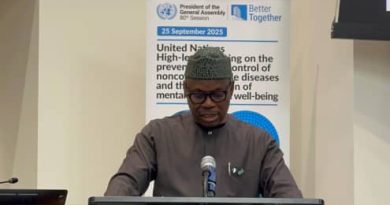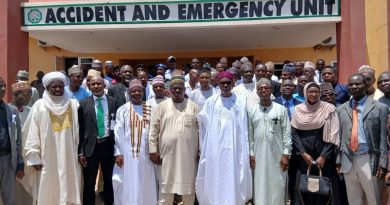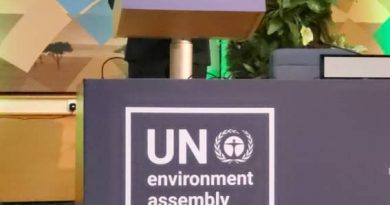Wanted: An Inspiring National Leader
By Bola Ahmed Tinubu
Where does Nigeria stand today? Today, we loiter on the road of confusion because we are guided by leaders who themselves need guidance.
The dream of a robust and great nationhood has been deferred. Nigeria now limps and pleads for crutches to help it just to stand.
Former United States (U.S.) Ambassador to Nigeria, Walter Carrington, while delivering a lecture at entitled “On the Dawn of Nigeria’s Second Century: Challenges to a New Generation” at the University of Ilorin convocation ceremony brought fresh insights into Nigeria’s current precarious conditions in various sectors. I share most of his positions and postulations and couldn’t agree more that Nigeria though a giant in Africa is punching below its weight.
For Ambassador Carrington, the greatest challenge to Nigeria’s development is corruption closely followed by insecurity. The most gripping of Carrington’s lecture are the data and statistics about Nigeria’s. He was very provocative on the position of Nigeria, nay Africa, in the global equation.
Let me quote Carrington. “The latest Human Development Index of the United Nations Development Programme, better known as the UNDP, was released in March this year and lists the world’s 46 lowest ranked countries. Thirty-seven of them are in sub-Saharan Africa. All of the bottom 26 is African with the single exception of Afghanistan. Out of 187 countries surveyed, oil- producing Nigeria is ranked 153, the lowest, by far, of any non-African member of OPEC. Indeed, with the exception of Angola (which ranks 5 places higher than Nigeria), all other members, including war-ravished Iraq (107), are included in the ranks of the more developed. Your neighbor, Niger, at 187 has the dubious distinction of coming in last”
It would not be so sad if we closed our eyes in order to dream of a better Nigeria. Instead, we close our eyes so that those who lead us can make things worse. We must stop the charade. We no longer have the luxury to play such a distorted game.
We lap up the story of our yesterday as we recall with nostalgia Nigeria’s post-independence era. Though turbulent at first, Nigeria soon settled down to calmer waves and we saw development all over as we settled into nationhood. A crop of leaders forged in the nationalistic struggle for independence and schooled in some of the best institutions in Europe and America took charge and charted a course for our nation. They had a vision and made us dream of a country where though tongue and tribe may differ, still stands in brotherhood. Those were the days when with pride we declared and carried the badge of nationalism and being Nigerian.
Unfortunately, as we entered the second decade of nationhood, the bottom fell out. We all know about our descent into spasms of military dictatorship and civilian miss-rule that led to the collapse of the second republic. I will not dwell much on this point, but suffice to say here that we are a people still in search of true nationhood. The derailment of our dreams and the blurring of our national vision by some of our past leaders have consequences for both our present and future.
Today reminds us of yesterday. Of how we perhaps headed in the wrong direction. Today, we fret regarding the course of the nation and even about its longevity. Some stay she will fail. Some say she has already done so. Some believe that tomorrow can only be one of doom.
For years, the idea of a national dialogue has been bruited. Government has always slapped the notion away. Now, devoid of ideas and with its back to the wall of poor performance, the current government grabs at the notion much like a drowning man does a life vest.
Yes, we need to talk. I remain an ardent supporter of the call for a national conference that is sovereign and truly open to all. That is the only route out of the woods. We must bring Nigeria back on the path of true federalism. A staged-managed affair scripted and monitored to achieve the narrow political aims of narrow political minds in Abuja will do nothing but whet Confusion’s appetite. Anything short of a Sovereign National Conference will be like trying to apply a bandage to a tornado. So soon after calling forth this event, we have seen the deceptive, unsure steps of the government. Many of those that attacked my position in questioning the sincerity of the government are now retreating from the Jonathan Conference. All I ask is that you watch not with blind hope but with a watchful eye. I believe you will come to see this as the dark alley that I see.
Now, back to the larger issue, the picture of Nigeria as it now stands. If you ask me to describe the state of the nation I would say it is an ambivalent one.
Nigeria is a nation standing half in the light of progress and promise and half in the darkness of injustice. We live in a period of grave uncertainty. As things now stand, we have no idea where the nation is headed.
We live in a fast-paced world but Nigeria is only crawling. In front of us, progressive development moves quicker than us. With each day, the distance between development and us increases. Behind us, calamity moves fast, gaining ground on us. With each day, it comes nearer and near to us.
I shudder to think of the state of the nation in years to come if we continue in this limp fashion. Those now in government take false solace in the belief that Nigeria is a land of happy, carefree people who will somehow manage to eke a living no matter how badly governed we might be. Those in governance better look again. Whatever happiness we had was born of fantasy or of faith and patience that a better day was to come. It was not based in the fact of good governance because little in their governance has been good.
But even strong faith wilts under an avalanche of bad tidings and misfortune brought about by clumsy, wrong-minded governance. A jobless, hungry man cannot eat fantasy or faith. His reality forces him to choke on them. The people are asked to suffer and be patient while those in Abuja revel and fete each other as if mimicking ancient Rome at the height of empire.
These forces of high privilege and regression want to consume more than their share. This means they are willing to steal a good portion of yours. While we pray and strive for democratic governance ushering in a progressive era of broad prosperity, development, democracy and human dignity, these conservatives seek to stifle you as modern serfs living ramshackle lives, half-fed, under employed, and desperate for a hand-out.
Many have become so desperate that they thank these people for lending us a small pittance of the money they pilfered that is rightfully yours to begin with. They wash their feet in champagne. Meanwhile too many people struggle to find clean water to soak their garri. They seek a nation comprised of a small, well-oiled and happy elite and dry, struggling masses. Robin Hood would run from Nigeria because it operates on principles opposite to those that endeared this mythic hero to our imagination. Instead of bringing balance by taking a bit from the rich and give to the poor, our current system robs from the poor to give to the rich.
The self-appraised glowing performance report of the ruling government of Goodluck Jonathans one of the most remarkable, creative works of fiction ever written in Nigeria. The Mathematics about GDP growth, about economic empowerment, about energy provision, about employment do not add up. And here is why. Even though according to the IMF Nigeria parades the second largest economy on the sub-continent with a GDP of 270 billion U.S. dollars second to South Africa whose GDP is 375 billion, there is nothing to show for it.
The PDP government claims we have one of the world’s fastest growing economies and that our GDP expands by nearly seven percent per year. Yet, the people don’t feel this happy expansion. The official youth unemployment rate nears 50 per cent. The true rate, when joined with underemployment, may be over twice that amount. Most graduates from our tertiary institutions will not be greeted by job offers once they leave campus, but by an indefinite period of joblessness.
World Bank in its 2013 report says Nigeri’s unemployment rate is 22 per cent while Youth Unemployment rate is 38 per cent.
Millions of Nigerians are being pauperized and continue to fall below poverty line. The AFDB, in its African Economic Outlook report of 2013 revealed that poverty has worsened since 1996 and through 11 years of the PDP’s rule. The efforts of President Jonathan’s government at combating poverty was also faulted.
Another global institution, The World Bank also in its ‘Nigeria Economic Report’ released in May 2013 stated that “Poverty rates remain high in Nigeria, particularly in rural areas.”
“While the officially reported growth rates of GDP well exceed population growth in the country, the pace of poverty reduction does not, this implies that the number of poor Nigerians living below the poverty line has grown measurably,” the report stated.
No populous nation ever reached prosperity without a vibrant manufacturing sector. It is this sector that is the mainstay of urban employment just as farming is the mainstay of rural jobs. Thus, the more we move toward urbanization, the more vital is manufacturing as an economic catalyst. However, our manufacturing sector shrinks under the policies of the current government. As it shrinks so do the job opportunities of that vast army of city dwellers.
Agriculture remains stagnant. We have made little progress toward returning to the days when Nigeria had surplus and exported food. Now we import too much food for our own good and security. Our small farmers suffer because there is little government support and assistance. They sink under the reality of rising costs and too little income from the crops they raise. Moreover, we annual lose arable land to desert encroachment as harvests are spoiled by extreme conditions of drought and flood. Too many of our old people have little, save misery, to look forward to in their golden years. Pension plans have proven unreliable and government would rather turn its back on the elderly than help them through their frail years. After having worked for the good of the nation and lived decent responsible lives, they find themselves alone. This is a shameful rip in our social fabric.
Our infrastructure remains outmoded. It was established for a small nation not a large, productive one. If not for progressive state governors, road construction in Nigeria would be minimal. Too many federal roads remain avenues of nightmares, fear and death. Driving these roads is tantamount and as dangerous as going to war.
Social services remain nil. Primary health care is a mirage. Too many pregnant women go into ill-equipped hospitals and clinics not knowing whether they will have a joyful appointment with timely birth or grim rendezvous with premature death. We lose far too many mothers and children to diseases and medical situations readily treatable if we had decent medical facilities. Instead, the best health care in Nigeria is still a plane ticket abroad. Health care is only for the elite. For the rest of the people, the government does not care.




